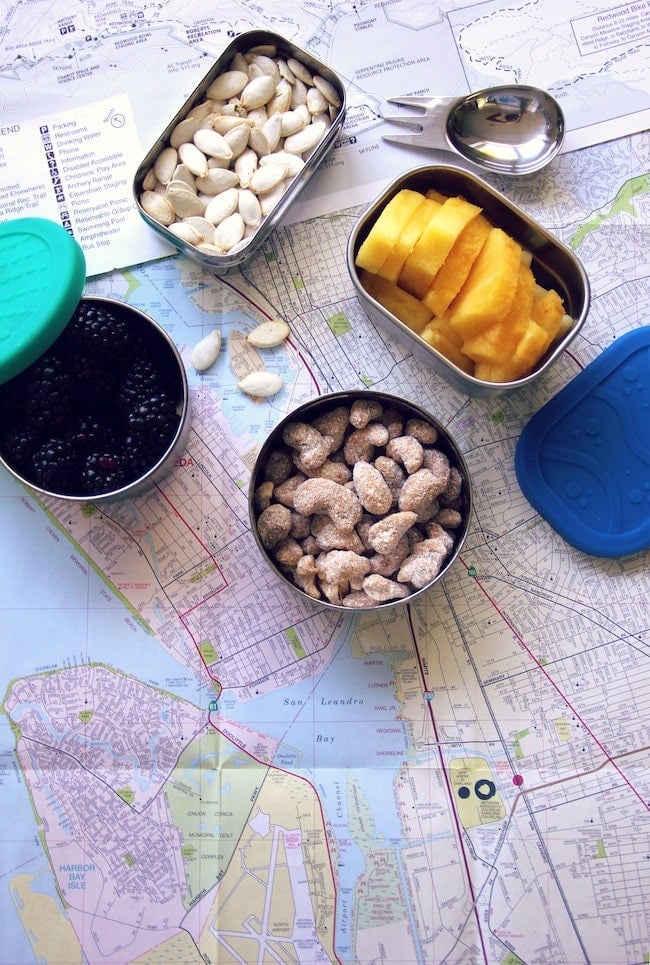10 Tips for How to Eat Healthy on a Cruise
While it can challenging to stick to a diet when traveling, here are my top 10 tips for how to eat healthy while on a cruise ship. From managing special dietary needs to avoiding excess sugar and alcohol, use these tricks to stay healthy while you’re traveling on the ship.

While some people go on vacation to break all the rules and indulge completely, there many reasons that people want to eat healthy when traveling on a cruise ship. The most significant reason is to manage a chronic disease and maintain the healthy habits followed at home.
Other reasons for eating healthy on a cruise include keeping your immune system strong, not wanting to gain weight, wanting to maintain your weight, and wanting to feel energetic while traveling.
Sadly, though, cruise ship dining and health don’t necessarily go hand-in-hand. Be it the 24-hour room service, the outrageously tempting dessert buffets, or simply the rich food, cruise ships have earned their reputation as potentially very unhealthy environments.
I have fallen into the trap of eating too much on a cruise and then suffering the consequences of feeling less healthy and fit when I get home.
I’m excited to report that after going on many cruises over the last two decades, I’ve came up with some strategies for how to eat healthy while cruising. I most certainly don’t eat perfectly while cruising (or any day for that matter), but I love coming home feeling good without feeling like I missed out on the culinary part of it.

10 Healthy Cruising Tips
Here are some of my tried and true tips for sticking with a healthy diet while on your cruise vacation.
Whether you’re on a Royal Caribbean Cruise, Disney Cruise, or Celebrity Cruises, these best tips should help you make better choices and keep you feeling your best.
1. Disclose your dietary preferences at the time of booking
It’s important to alert your cruise line ahead of time to your dietary needs. You need to do this at the time of booking.
For me, that’s gluten-free and dairy-free. I have had to pick and choose different operators depending on their willingness to accommodate special dietary needs, but it’s becoming more and more common these days.
The benefit of disclosing your dietary preference at the time of booking is that the catering manager will be notified of your needs and will make the appropriate orders.
You can also let them know if you are diabetic or need low-calorie or low-fat meals. Most cruise lines can accommodate special dietary needs.
2. Eat a big salad every day
Salad bars on cruise ships are usually absolutely beautiful and full of fresh veggies, fresh fruit, and toppings.
Take advantage of the salad bars and be sure to have a fresh green salad at least once a day to get healthy fiber and vegetables.
A side benefit to making sure that you get enough vegetables on a daily basis is that you will likely avoid getting traveler’s constipation and your bowel habits should stay fairly normal.

3. Bring healthy snacks or staples with you
If you love a certain type of granola for breakfast or you have a strong preference for tea or something like that, bring it with you!
I love adding a topping of granola to the gluten-free porridge I get at the breakfast bar to help add healthy fat, fiber, and crunch to the meal (see my list of the best gluten-free travel snacks).
While there is usually an abundance of food on cruise ships, it might not be food that fits within your healthy guidelines. That’s why I always try to take easily packable snacks with me, including:
- organic, unsulfured dried fruit
- organic nuts and seeds
- beef jerky bars and
- quality dark chocolate
Not only can you enjoy your snacks on the cruise ship, it’s also nice to have them with you if you go on excursions.
If you find that your appetite is waning and you aren’t hungry for dinner, then try skipping afternoon snacks altogether.

4. Ask for steamed vegetables instead of sautéed
While it’s important to eat healthy fats as part of a balanced, clean eating diet, most cruise ships and restaurants use a heavy hand of vegetables oils in their cooking.
So, to decrease your exposure to unhealthy cooking oils and added fats, you can simply ask for your vegetables to be steamed instead of sautéed (see my list of healthy cooking oils).
Steamed vegetables will have fewer calories than sautéed vegetables. If you are ordering something like fried eggs, you can also avoid vegetable oils by asking that you eggs be cooked in butter.
Making these types of tweaks to your meals is one of the best ways to stick to your healthy choices.

5. Avoid tea time baked sweets
Afternoon tea on a cruise ship can be tricky with so many sweets available.
A healthier snack option is fruit or something with protein like a hard-boiled egg or nuts. Or, if you find that you aren’t really hungry in the afternoon, then just skip tea time and go for a walk onboard instead.
This also brings up the issue of boredom and eating to fill the time. You may find yourself with a lot of free time while you’re cruising. I’ve been on cruises where we had two back-to-back sea days and I almost went crazy. To avoid eating out of boredom on a sea day, try to be mindful of your hunger cues and only eat when you are truly hungry.
If you find that you’re just bored, try having a glass of sparkling water instead, or try to do something active to help pass the time.
6. Choose healthy (or healthy-ish) desserts
Eating healthy while traveling doesn’t mean you have to completely avoid dessert. Choose desserts like sorbets as opposed to the richer cakes and ice creams.
Most cruise ships now offer sugar-free treats as well, although you might need to ask them what they are using to sweeten their desserts. See my list of the best sugar substitutes.
Or, if you don’t want to feel deprived, you can ask your waiter for a very small portion of dessert. That way, you can have a few bites without feeling like you need to eat a whole serving.

7. Eat breakfast, preferably with protein
Having a high protein breakfast can help with weight loss and weight management.
Getting a nice cooked breakfast on a cruise ship is no problem! Even if you plan to get off the ship early for an excursion, you can usually order room service even for an early morning breakfast in your room.
Shoot for a minimum of 20-25 grams of protein for your breakfast meal. This will help get your day started right and fuel you for the day’s adventures.

8. Minimize alcohol intake
Alcoholic beverages can be a problem for many people while cruising. Often, beer and wine is included in the cost of your ticket. But, that doesn’t mean that you should be drinking. Alcoholic drinks are full of empty calories, meaning that they are high in calories but low in nutrition.
Drinking can also cause you to make less ideal decisions. If you don’t want to abstain completely from alcohol, allow yourself to have a sip or a very small glass of red wine with lunch or dinner.
A glass of sparkling water with lemon or lime is a great alternative to an alcoholic beverage.

9. Drink enough water for you
Hydration is important when traveling in general. Getting plenty of water will ensure that you don’t get dehydrated and that your detox systems are working well.
There isn’t a set amount of water that you need to drink, but just make sure you aren’t getting thirsty is a good rule of thumb.

10. Enjoy the experience!!!
Making healthier choices doesn’t have to take away from the joys of traveling, especially if you’re easy on yourself and just do your best. Perfection is not the goal, but finding that balance between reasonable and indulgent is the challenge.
Find a way to splurge a little bit every day or at every meal. Most of all, enjoy the experience and the new adventures you are having. Remind yourself that you will get back to your routine in just a short amount of time, and that you are doing your best to stay healthy.

Bonus Tips
This list is not exhaustive. Other ways to stay healthy on the cruise are to avoid buffets and eat served meals in the main dining room. People tend to eat more at buffets. You can also ask for small portions for your meals to avoid too much food.
It’s also a good idea to visit the fitness center or try to get some sort of physical activity each day. This can help you feel more in touch with your body and aware of your physical needs.
FAQs About Healthy Cruising
Many cruise lines can offer gluten-free meals and options. You will need to check with your travel agent or speak directly with a cruise representative to make sure your needs can be met. Try to do this at the time of booking or prior to booking.
If you are on a diet for health reasons, it is possible to stick with your healthy approach while taking a cruise. But, you may need to plan ahead of time and speak to a cruise ship representative about your needs. The cruise ship dining staff may be able to offer low-calorie options or smaller portions to help you stick to your goals.
Have you cruised before? Do you have any tips I missed? Let me know in the comments!
Don’t Miss These Additional Resources
Don’t forget to join my newsletter list to get exclusive clean eating recipes and tips. The newsletter is 100% free with no spam; unsubscribe anytime.
About the Author: Carrie Forrest has a master’s degree in public health with a specialty in nutrition and is studying to be a holistic nutritionist. She is a top wellness and food blogger with over 5 million annual visitors to her site. Carrie has an incredible story of recovery from chronic illness and is passionate about helping other women transform their health. Send her a message through her contact form.
Note: this post is for informational purposes only and is not intended as medical advice. Please consult your healthcare provider for recommendations related to your individual situation.





















Have what you want but don’t eat it all. Sometimes a small bite or two of something you really want that is not one of your better choices is all you need to satisfy yourself. Always think about what you are eating. Its when you are not mindful that you can get yourself out of whack. The reality is that this is not the last time ever in your life that you will be able to have “that”. Yes you deserve it but think about how you will feel the next day.
Great tips!
Thanks for posting this. Eating healthy is the hardest part of traveling. Great tips.
Some great ideas here and pragmatic hints and tips! There is no excuse to not reduce the risks when you see what can be done based on your post ideas…
It’s difficult to eat clean on cruise ship but you’ve managed it so well. Congrats !
I love this post as eating healthy on a cruise ship is not easy, I know from past experience. Great tips and advice xxD
Those are some really helpful tips, especially if you’re gluten free and dairy free. It’s great that more and more companies are becoming accommodating these days as there is more demand for it.